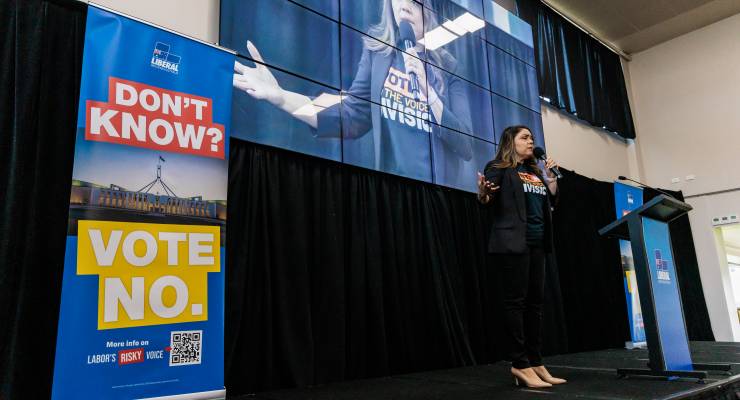
As the No side’s lead in Indigenous Voice to Parliament referendum polling grows, those holding out any hope of reversing the trend are focusing on “soft No” and undecided voters.
References to “hard” and “soft” voters come from polls that ask respondents how sure they are that they will vote a certain way. Those who pick the highest level of certainty are labelled as “hard” voters; the rest are considered “soft” and more persuadable to switch. This concept also appears in elections, where it is usual for the intending Labor vote to appear slightly softer than the Coalition’s.
Redbridge has produced the most detailed breakdowns on hard Yes and No votes. In its most recent poll, it finds that more of the No camp’s support is bolted down (67% vs the Yes camp’s 56%, noting that both are lower than otherwise because Redbridge make respondents pick a side).
In Redbridge’s data, No-voting Coalition supporters are more likely to be hard No than other No voters, and Yes-voting Coalition supporters are more likely to be soft Yes. Labor voters are less likely to be at either end of the spectrum. Inner-city No voters are relatively likely to be soft No, while outer-city Yes voters are more inclined to be soft Yes. Younger (under 35) No voters are more tentative than other No voters, while voters 65 and older have voted in a lot of referendums and tend to have firmer opinions whatever side they’re on.
The Essential poll, which allows respondents to stay undecided if they say so, also finds that No supporters are more set in their views. Essential had 81% of No voters as “hard” in August and 85% in September, compared with 72% and 71% of Yes voters respectively.
As for undecided voters, some polls including Resolve and Freshwater have forced initially undecided voters to pick Yes or No, but have also released the figures prior to forcing, while JWS has released first and second pass results without employing forcing. On average these pollsters have found initially undecided voters breaking about evenly in intention between Yes and No.
Excitable claims that there is an enormous undecided voter cohort out there — the suspense! — are a media trope at election time. This referendum is no different, with some reports of internal-polling spin alleging up to 40% haven’t made up their minds. However, undecided rates found by serious pollsters, especially those who prod wavering respondents, aren’t nearly so high. Essential and Newspoll have had undecided rates of around 10%, compared with 6% for voting intention polling. Polls also suggest the undecided rate is lowest in Queensland, the most anti-Voice state.
If the polls are even nearly right, the task for the Yes side is daunting. The most recent polls that allow for undecided votes still have No at an average of 50%. If Yes could get all the undecided votes (this never happens), Yes would still have to lose no more soft voters to No than the other way around, although on Essential’s numbers Yes has more soft voters to lose. Even if Yes makes it to 50%, it’s doubtful now that that’s enough.
With support in South Australia now behind the national average by 1% in aggregated polling, the Yes side is sliding into extra trouble with the double majority rule. A referendum must be passed by four states to succeed, and on average historically that hurdle has given No an edge that is worth about 3%. The fourth-highest state for Yes has finished behind the national total in 42 out of 44 referendums.
There is also the question of how persuadable soft No voters are. Given the trajectory, they’re often former undecided or soft Yes voters. They may have developed concerns about the Voice being exposed to new criticisms, had reservations, but only recently felt socially licensed to vote No, or even be inclined to use the referendum to sound off about something different.
Indigenous leader Noel Pearson for the Yes campaign is confident that talking through the issues with soft No voters can flip them. That may be so on many objections on a one-to-one basis, but I doubt that the Yes campaign has the ability to find and target enough soft No voters with the right rebuttals fast enough.
Have you lost all hope the Voice referendum will be passed? Let us know by writing to letters@crikey.com.au. Please include your full name to be considered for publication. We reserve the right to edit for length and clarity.








near NO-curious voters – be assured that a NO vote does not make you a lying, ignorant, selfish racist – however, if you do vote NO, you will be supporting, validating and encouraging a lot of lying, ignorant, selfish racists
*dear
You are right. The solid Nos I have spoken to have swallowed, to a man ( mostly men), the lies and/or misinformation from the ‘No’ side and revert to what they see as the safe/less radical response.
It is a worry that there is no questioning.
It worries me that the same unquestioning group-think approach has led to some of the worst examples of inhumane treatment of our fellowman through history.
Why do you think Australia has had mostly conservative governments since WW2? Why do you think Albo is too scared to do anything other than implement the Abbott (climate) and Morrison (AUKUS and S3 tax cuts) brain farts? Because we’re a country of scared middle-aged white men.
I hate that the No campaigners (Liberal and National party members and politicians) support this. Having a “Voice” can only help indigenous peoples have a better life. Vote YES.
Soft yes/no’s and undecided’s might equally be described as the “whatever’s” or “I don’t give a $h!t’s” and I reckon they account for 30% of people according to my straw polling..
And being disengaged from politics isn’t exactly bad for their health either, since they tend to be happily occupied with other matters, and already have Medicare.
It’s finals season now and this political football match could go either way until the final siren sounds at 6pm on the 14th.
I know it’s so much more than a game, but still gotta love an underdog.
‘Carn the YES!!
More evidence of how ‘polling’ has become ubiquitous to everyday news media, it’s far more common, another part of politicised narratives and more about PR &/or media access or business?
Were still a month out but polls seem to take precedence over actual analysis, voting and worse, evidence of ‘push polling’ when presented in RW MSM?